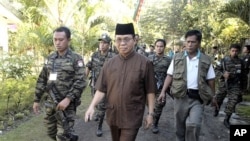The Philippines government lead negotiator says the core of the problem with Muslim separatists is not religion - it is identity.
Marvic Leonen, head of the peace panel negotiating with the Moro Islamic Liberation Front, (MILF) says his team looks forward to hashing out several aspects of the "comprehensive compact".
"It’s not a declaration of independence," noted Leonen. "I want to work on that. It is looking for Filipino citizenship with Bangsamoro identity. I want to work on that. It is not all of the territory that’s part of the historical claim by many of their intellectuals. So I want to work on that."
Bangsamoro refers to 13 Muslim ethnic groups, concentrated in the southern Philippines, which is a predominately Roman Catholic nation. Several groups have fought for nearly 40 years for a separate homeland.
As part of efforts to revive peace talks, the MILF has given up claims to some territory in the south.
But during a forum with foreign journalists Wednesday, Leonen said that those land claims do not stem from religious differences.
"It’s not Muslim versus Christian. It’s the Bangsamoro problem," Lenonen stressed. "The Bangsa there is for nation and the Moro there is an identity that was created as a result of what happened in history, that, of course, they were part of the oppressed by (in) our colonial past."
The peace panel chief says this makes it more of a question of nationality. The Philippines was under Spanish rule for more than 300 years and the Spanish name Moro for Moors referred to Muslims. The country came under U.S. rule in 1898, before becoming independent in 1946.
"The challenge is are we willing to recognize Bangsamoro identity with Filipino citizenship?" he explained.
Leonen says he will seek clarification on how the MILF defines Bangsamoro at the next scheduled talks, on March 29. This will be the 21st such meeting in 40 years.
During talks last month, both sides agreed to retain an international peace monitoring team to uphold a ceasefire as negotiations continue. As part of the ceasefire, the MILF reiterated its commitment to the peace process and its desire “to boost confidence from international and local communities.”
The Philippine government does have concerns about the risk of an MILF faction, led by Ameril Umbra Kato, breaking away.
Last month, the MILF confirmed that Kato's group remains part of the force and is subject to the rules of the ceasefire. Leonen says Kato's force remains a serious concern and that police and military are in a state of defensive readiness. However, Leonen says based on information from the military, he does not see the Kato faction as a disruption to the peace process.
More than 120,000 people have died in the fight for self-determination.
Philippines Prepares for Next Phase of Peace Talks
- By Simone Orendain




